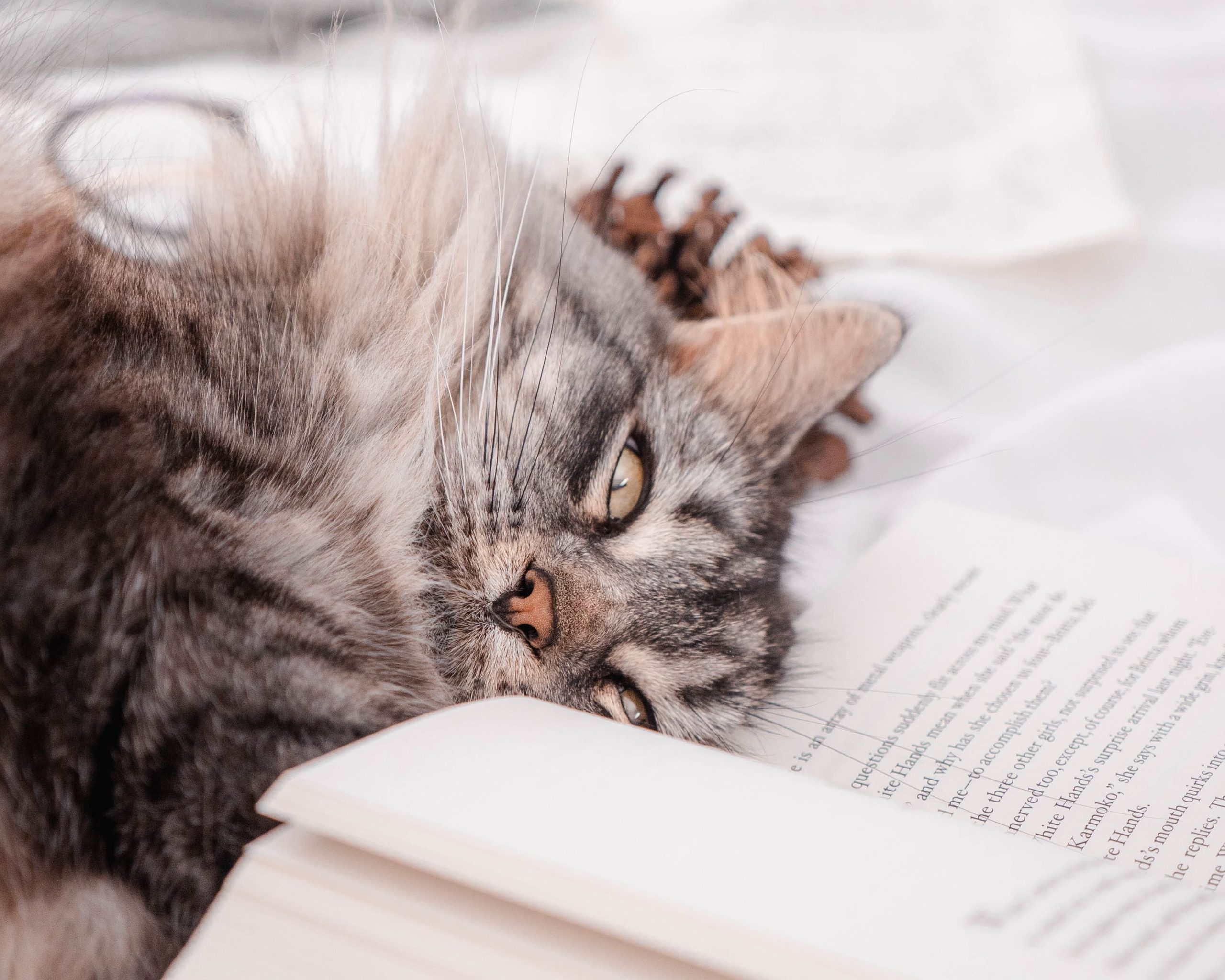Most of my really potent reading memories have less to do with exact books or passages, and more to do with the city I was living in, the people I was surrounded by, and the things happening on the fringes of my life as I read. It’s for this reason, in part, that I tend to keep a near-religious accounting of the books that I’ve read and the movies that I’ve seen and the records that I’ve listened to, each operating as a sort of snapshot of wherever I was in time. Years removed now, and I have no recollection of how House of Leaves ends, but I vividly remember turning the pages feverishly in tandem with an old roommate during the final weeks we lived together, or shotgunning Murakami books at a coffee shop the summer after I finished college, or extending silent reading time by an additional few minutes in my old seventh-grade classroom just so I could finish the last few pages of Sing, Unburied, Sing.
Far and away the most consistent presence across these memories is my cat, Kula, a half-domesticated former stray who’s moved with me now, across the country, from Colorado to Illinois, back to Colorado, back to Illinois, and finally—for now—to Southern California. Kula’s been by my side for each of these moves, and by this point, countless novels and short stories and poetry collections: brushing up against my legs as I combed through Stories of Your Life and Others on the outdoor couch; pretzeled on his cat tree as I shivered reading Friday Black the winter that I couldn’t get my bedroom window to shut all the way; nipping at my hair at the onset of the pandemic as I reread Station Eleven for a preposterously timed speculative fiction class. No matter what I’m reading, Kula always seems to embed himself in the story.
Not all cat people are readers, of course, and not all readers are cat people, but it’s unarguable that reading, a supposedly solitary activity, tends to pair well with this supposedly solitary animal. With that in mind—and with apologies to “Cat Person”—below are seven great, cat-centric Recommended Reading stories published over the years by Electric Literature. A warning: many of these stories are not for the faint of heart, featuring less-than-ideal narrative outcomes for our furry companions.
“Horribilis” by Amanda Marbais
“One evening, I ran over a cat,” begins Amanda Marbais’ claustrophobic and darkly funny “Horribilis,” which originally appeared in her 2019 short story collection Claiming a Body. “Upon impact, its flat eyes reproached me, like it hadn’t known pain before,” the opening paragraph continues. “I got out of the car, stood in the headlights, and cried . . . I’m a vegetarian!” Following this nightmarish opening for cat lovers (or, hopefully, for anyone), our narrator, already afraid of nearly everything, develops agrizoophobia—the fear of wild animals—with the phobia taking a particular fixation on cats specifically. “To have a cat phobia is not to be able to use the Internet,” our narrator reflects wryly. “It’s all porn and cat videos.”
“Can a Cat” by Olivia Parkes
Can a cat survive falling off a skyscraper? The perennial internet debate/bar trivia question is the catalyst for Olivia Parkes’ “Can a Cat,” in which the opening scene finds an unhappy couple arguing over this exact question. An event of morbid coincidence—a cat plummets from the sky and lands on a nearby table, where it, after an agonizing couple of moments, finally dies—interrupts them. “The idea that our marital strife could have made a cat fall from the sky, though fantastic, was weirdly in keeping with my research, or at least with the wispy thought of the New Age gurus it had led me to on YouTube,” reflects our narrator, surmising that she and her partner’s argument may have summoned the cat to its death. “I did not know what I believed—only that the cowardly and increasingly unreal nature of our discord was having a violent effect.”
“Eau de Mims” by Nick Otte
The conceit of Nick Otte’s “Eau de Mims” may seem like a relatively straightforward fabulist premise, but it amplifies in strangeness the more time you spend with it. At the start of the story, our narrator realizes that her deceased mother has come to inhabit the mouth of an alley cat named Jodie who lives behind her New York City apartment building. “Jodie is a tabby, marble-eyed with orange peel stripes along her back,” remarks the narrator. “I feed her and the other kitties in the alley beside my building every morning . . . it was fun for a while, that is until Mims took up residence behind Jodie’s sharp little teeth and started carrying on.” Is the narrator’s mother really occupying the stray cat’s mouth, or is the narrator just experiencing a manifestation of her grief?
“It Is What It Is” by Azareen Van der Vliet Oloomi
“She’s an average cat,” our narrator’s roommate informs her, midway through Azareen Van der Viet Oloomi’s “It Is What It Is,” in a refrain that will be familiar to many cat lovers whose friends and family just can’t seem to understand what’s so special about a given pet. “Stop projecting on her.” The plot follows our narrator, who, after seeing a social media post about a cat in Canada whose Iranian owners have been shot down over Tehran, sees a reflection of the traumatic state of global affairs in the cat’s story. She reaches out to the cat sitter about adopting the animal, and, when its arrival at her apartment immediately presages the start of the COVID-19 pandemic, she comes to view it as a kind of omen. “Don’t you think it’s possible that [the cat] was intimating news of the cosmic violence we are engulfed in?” she asks her roommate in April of 2020, as the world around continues to spiral more and more out of control.
”The Cat” by Tove Ditlevsen
Originally published in Tove Ditlevsen’s 1952 short story collection, Paraplyen, “The Cat” follows an unhappy couple who come to blows over, of all things, a cat. “He let it out, and she let it back in,” we’re informed by the narrator. “When they lay in bed in the evening, they heard the faint meowing outside their front door, and she got up to give it something to eat, while an incomprehensible resentment arose in her husband. ‘Don’t let it in,’ he yelled to her. But in the morning there it was down in the living room, jumping elegantly up onto her lap.” The conflict at the center of the story will ring true to anyone who’s ever been in conflict with a significant other over feline affection, as will the lack of a tidy resolution.
“In the Rain” by Steven Barthelme
“She was a nice wife, even liked me for a time,” begins Steven Barthelme’s “In the Rain.” “I enjoyed her company, and in the early days, when sleeping together had this scorched-earth sort of magic, we mistook that for love . . . this is what I was thinking, standing in the rain, the day the cat came back.” Having been left the cat (“old Rilkey”) by his ex-wife, our narrator finds himself saddled with an animal that he cares for without really meaning to, even as he suspects that it has only been bestowed upon him because of a new boyfriend with an allergy or a distaste for cats (“. . . not that I blame him,” he can’t help remarking). After the cat drags itself back into the house, soaking wet after being out for several days in the pouring rain, our narrator remarks: “I loved him. That’s a feeling, isn’t it?”
“A Cat Called Grievous” by R. L. Maizes
In R. L. Maizes’ “A Cat Called Grievous,” a bored, childless couple adopts a cat named Grievous. “People are fond of saying that ‘dogs have masters and cats have servants,’” writes Halimah Marcus in her introduction to the story. “[This] statement [is] mostly true, and, I will argue at the risk of revealing myself as a cat person, makes cats richer subjects for fiction. Dogs are loyal, and cats are indifferent. Give a cat an owner, and there is already a conflict.” And, sure enough, conflict develops for Maizes’ characters quickly. “Sometimes I think you love that cat more than you love me,” one partner says to the other, and we’re off to the races.

























































